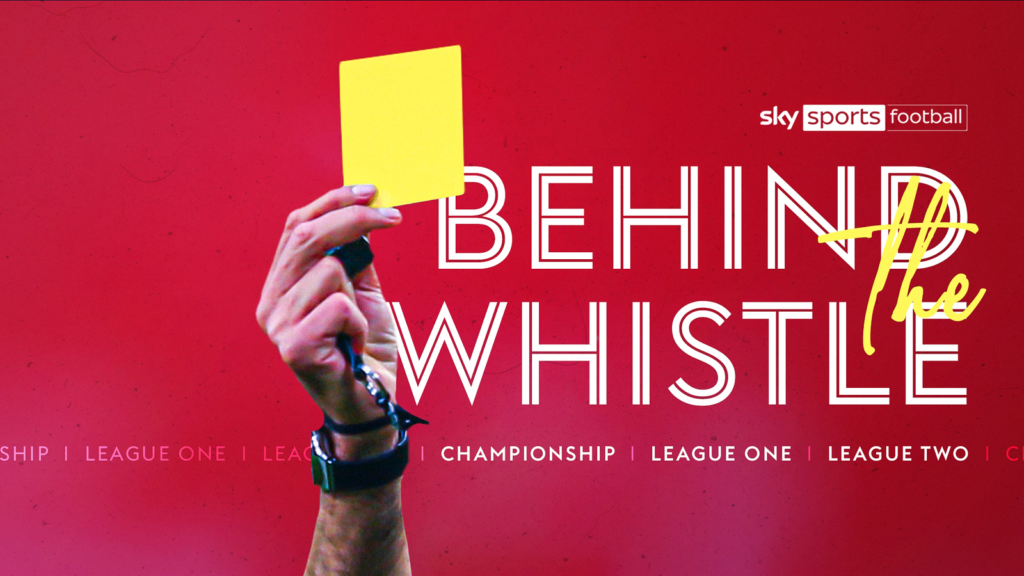In Behind the Whistle, former Premier League referee Chris Foy goes through a selection of key match decisions from the latest action in the Sky Bet Championship, League One and League Two.
Behind the Whistle aims to give supporters of EFL clubs an insight into the decision-making considerations and also clarification of certain calls to provide an understanding of how the laws of the game are interpreted.
As part of a regular feature on Sky Sports following the conclusion of a matchday, Foy will be here to run you through some refereeing matters in the EFL…
Sky Bet Championship
Incident – Yellow card (Luton Town)
Decision – Red card for second yellow (Luton Town)
Foy says: “The referee has no option here but to dismiss the Luton Town goalkeeper in this situation. The goalkeeper had been warned earlier in the game for delaying the restart of play and had then been shown a yellow card for delaying the restart of play a minute before this challenge.
“The goalkeeper comes out of his area at pace and commits a reckless challenge. This is well recognised by the referee who shows a yellow card which results, correctly, in a second yellow card.”
Sunderland 4-0 Sheffield Wednesday
Incident – Possible offside (Sunderland)
Decision – Goal given, no offside (Sunderland)
Foy says: “This decision is a brilliant one which highlights the first-class awareness and judgement of the assistant referee here.
“Watching the video in full speed, it would be easy to assume the Sunderland attacker who scored the goal is in an offside position. However, when stopped at the point of the first shot, we can see the attacker is being played onside by Sheffield Wednesday’s No 11 on the near side.
“The assistant referee correctly keeps his flag down and the goal is awarded.”
Incident – Possible red card, serious foul play (Leeds United)
Decision – No red card (Leeds United)
Foy says: “This incident requires the referee to consider the speed, intensity and force of the challenge and make a real-time judgement as to whether this is a serious foul play challenge and a red card. My view is that the referee makes a good decision here by opting to show a yellow card to the Leeds No 3 for a reckless challenge.
“It’s clear that West Brom’s No 8 and Leeds’ No 3 both look to challenge for the ball, however West Brom’s No 8 gets there first. Leeds’ No 3 arrives later and makes contact, however he retracts his leg as the two players collide which reduces the force in the challenge.
“Whilst there is speed in the challenge, with both players competing for the ball in the air and no excessive force used by Leeds’ No 3, a yellow card is the right outcome.”
Sky Bet League One
Huddersfield Town 2-1 Stevenage
Incident – Possible penalty, holding (Stevenage)
Decision – Penalty given (Stevenage)
Foy says: “This is an example of clear and impactful holding as Stevenage’s No 2 is forced to the ground inside the centre of the box.
“As the cross comes in, the ball is heading in the direction of the Stevenage No 2 who is prevented from moving towards the likely dropping zone by a clear holding action from Huddersfield’s No 17.
“Because this is a non-footballing action and has impact by preventing the attacker from moving towards the ball, the referee correctly points to the spot.”
Incident – Possible penalty, foul (Lincoln City)
Decision – No penalty (Lincoln City)
Foy says: “Although Barnsley’s No 4 is attempting to win the ball, his challenge is late and reckless as he catches Lincoln City’s No 2. Where there is inevitable contact from momentum when there is a clear action to try and block a ball, play typically continues, however where a challenge is reckless or considered serious foul play, a penalty and yellow card, or red card, should follow.
“In this case, a penalty should’ve been awarded to Lincoln and a yellow card shown for the reckless challenge inside the penalty area.”
Sky Bet League Two
Incident – Possible red card, denying of an obvious goalscoring opportunity (Port Vale)
Decision – No red card (Port Vale)
Foy says: “Port Vale’s No 20 mistimes his tackle on the Tranmere Rovers attacker who is clearly moving toward his opponent’s goal with an obvious goalscoring opportunity. The referee should therefore have awarded a free-kick and shown a red card to the defender for denial of an obvious goalscoring opportunity.
“The referee is trying to get himself into a good position to see the incident, however he misreads the situation, considering a touch on the ball. This was not the case and should have resulted in a red card for the Port Vale defender.”








